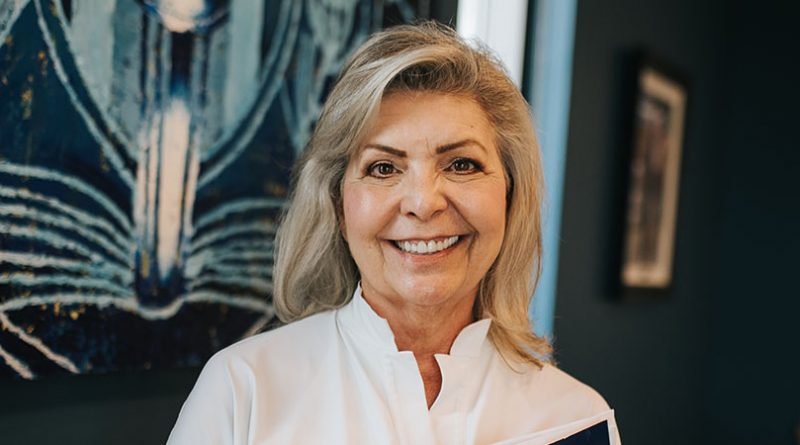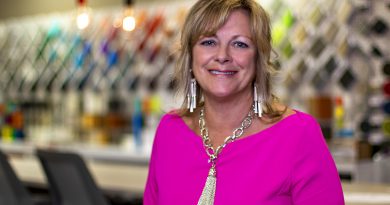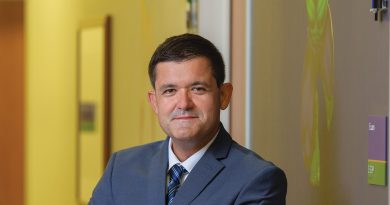Paying it Forward: Karen Clos Helps Students Explore Possibilities
By Janna Zepp | Photos by Justin Borja and contributed
As a first-time college student at St. Philip’s College in San Antonio, Karen Clos wondered why her instructor, Dr. Tony Pitrizello, would take her composition assignments out of a stack to be graded and place them at the bottom of the pile. Every possibility as to why he would do that raced through her mind until she finally worked up the courage to ask him.
“I read yours last, so I don’t want to kill myself after grading,” Dr. Pitrizello replied.
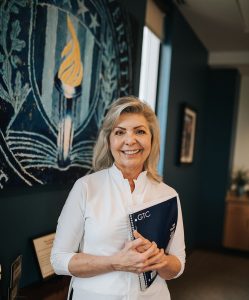
His guidance and belief in her academic talent set Clos on a professional journey that has been as much adventure as it has been a career path, including helping her get a job tutoring other college students in English at the college’s writing center. She said it paid $2.40 an hour, but it would become the first in a long line of employment working in academia and mass communications, eventually becoming Vice President of Educational Services at Temple College, President of the Community College of Denver and now Director of Communications at Texas A&M-Central Texas.
“I wanted to go to college, but it was hard. I applied for financial aid, which back in the 1970s took at least a month to get,” Clos says, remembering back to her time at St. Philip’s. Until the aid came and even afterward, Clos saved money every way she could think of by living with the family of a friend and by taking public transportation to and from school instead of owning a car and driving herself there. She was befriended by an elderly man who would pick her up from the bus stop every day on her way home.
“One day, he gave me a pack of gum during our ride. I thanked him, he dropped me off in front of the house where I stayed, and said he’d see me tomorrow. I looked inside the pack of gum and saw that he had given me $300 to help pay for my tuition. I was stunned,” Clos says. “I applied that money to my education. He was one of many people who shaped the trajectory of my life with a simple, loving gesture.”
Since that time, Clos has had a passion for helping others who are struggling to get access to higher education. Her particular interest evolved into an interest in adult education after being a general education development (GED) instructor at St. Philip’s College in San Antonio’s East Side. Inspired by her students, she went on to earn a Master of Arts degree in Adult Education from Incarnate Word University, a Master of Arts degree in Counseling Psychology from University of Texas at San Antonio, and later a Doctor of Education in Community College Leadership from the University of Texas in Austin.
While her work in higher education includes a number of leadership roles, she prefers not to count the titles, but the accomplishments. As the president of Community College of Denver, she grew enrollment by nearly 40% within four months of holding the position, and sustained that growth over three years, building the college’s first 150,000-square-foot building. But it is her work with Texas A&M-Central Texas that brings an enthusiastic smile to her face.
“We have a unique mission as a transfer-level university,” she said. “We are the place where students who have begun but not completed their undergraduate degrees can go to accomplish that goal.”
Clos’ work with local, regional, and state media began as a result of originally writing news stories on the accomplishments of Texas A&M-Central Texas students, faculty, and staff which were immediately picked up by both the Temple Daily Telegram and the Killeen Daily Herald. As a result of that, local television media began showing interest, and Clos began working with assignment editors and reporters to feature those stories and contribute expertise of the faculty and staff to developing news stories.
Clos recently earned a Master of Arts in English from Texas A&M University-Central Texas.
“Earning that master’s degree in English was challenging but rewarding,” Clos says. “Of all the degrees I’ve earned, this one really intellectually challenged me. Not that the others were easy, but as much as I have loved writing, this degree gave me a chance to really take a deep dive into that subject. I also got to experience what our own (TAMUCT) students go through while pursuing a graduate degree. It was a fantastic experience.”
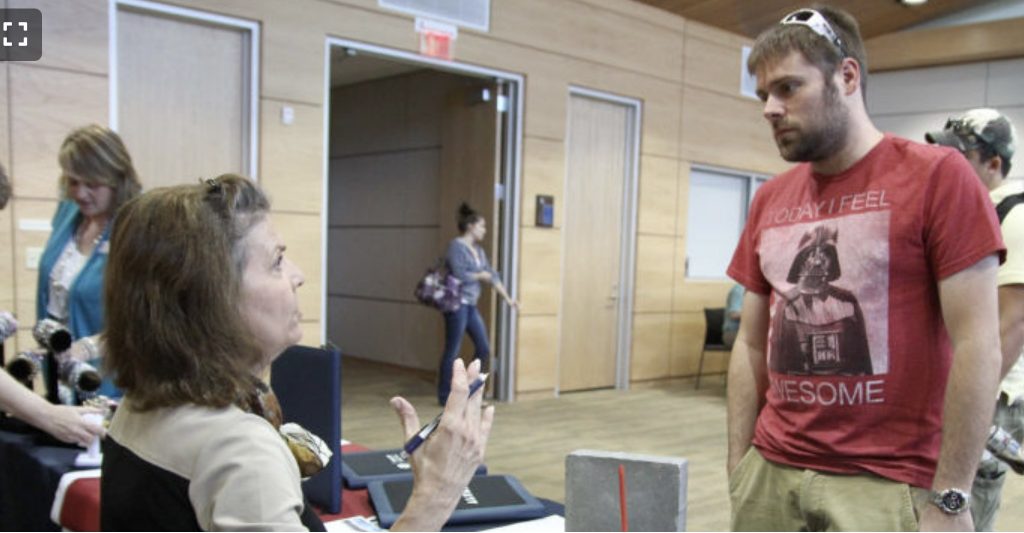
Clos’ love for writing and journalism manifested much earlier in her career, as she became a ‘stringer’ for the San Antonio Express-News in the mid-1980s. It was her interest and experience in ballet that launched her as a professional writer.
“I noticed that the San Antonio Express sent sports writers to cover Ballet San Antonio performances, so I sent a letter to the editor asking them to assign writers that knew and understood ballet to those stories rather than the sports guys,” Clos says. “Next thing I knew, I was covering them for the paper.”
When the Kirov Ballet (now the Marinsky Ballet) came from Russia to perform in San Antonio as its first stop of its tour of the United States, Clos helped the San Antonio newspaper coordinate a promotion of the ballet company’s visit with H-E-B Grocery Co. to hold a picnic on the Witte Museum lawn. Clos got to know some of the dancers personally and even asked Oleg Vingradov, Kirov’s director, why he chose to come to San Antonio first on their tour.
“I wanted to see a real cowboy,” he responded enthusiastically.
That response, Clos remembered, became the lead in a feature article.
“I’ll never forget rushing to buy the paper, unfolding it over my Sunday breakfast, and seeing that story above the fold,” she remembered. “I thought, ‘Wow. The ideas were in my head, and they became words, and now those words are on this page. There’s something truly remarkable about thinking that something you’ve written can accomplish that.”
Clos’ writing, her flair for promotion, her education, and her excellence in community communication has shaped her into an indispensable source for local journalists needing subject matter experts to consult on their news stories. Texas A&M University–Central Texas has a wealth of faculty members doing groundbreaking research in their fields, and Clos saw an opportunity to help both the university and the local media meet each other and help to inform important news stories. At her last count, Clos says, there were almost 2,000.
“What we are doing demonstrates that higher education is important. Of course, in the classroom, but also within the context of our larger community, our region, and the state.”
“Our faculty take their knowledge in the respective subject areas, and they leverage that knowledge for the benefit of our students. That extends the traditional classroom and compliments the newsroom.”
As a result of her work with local print and electronic news media, Clos has had the opportunity to work with dozens of reporters on a daily basis who turn to the university for the knowledge and expertise of faculty and staff.
“I have distinct memories of watching Cronkite on TV as a child,” she says. “I’m very proud that we have been able to be a part of the work that local media is doing. They’re my heroes,” she said. “Every single one of them.”
Being on the front line of ambitious causes seems to be a significant part of who she is, as her work includes a book published by the American Association of Community Colleges in 2007 entitled, To Be Honest: Championing Academic Integrity in Community Colleges. At the time, it was the only book written for community colleges dealing with academic dishonesty and promoting a culture of integrity.
Where did this drive to contribute come from? Clos remembers a seminal moment when she was the fledging department chair of a GED program.
“During my early experience as an adult educator, I noted that GED students were not considered ‘real students’ by the president. They were not permitted a student identification card or the opportunity to see the campus nurse when they needed medical attention. They were not allowed to check a book out of the library. These students paid a dollar for medical insurance through the school and were required to pay $5 for a parking pass, but not allowed to enjoy the benefits of being a ‘real’ student? That was horribly unfair,” Clos says, almost visibly seething.
“A new interim president came in some months later and she listened to me about it. It was then that my students became REAL students for the first time.”
What she has discovered over the years is that it is up to each of us, she says, to live up to the expectations of our respective professional standards, and when the opportunity to go above and beyond finds us, to leverage every talent we have and whatever we’ve learned for the benefit the place and the people we serve.”
Clos’ mission, more than anything, seems to be simply paying forward the simple, kind assistance from almost perfect strangers that she got as a student navigating a community college for the first time.
“A person just never knows what that one, single gesture will do to launch a marvelous future for another,” she says. “Not a day goes by that I don’t put my key in the front door of my home and remember the people like that English teacher I had as a student or all of the incredible mentors I have had,” she notes. “Those people made significant contributions to my life, and I owe it to them to do the same for others.”

